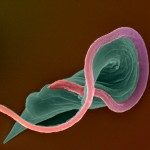Link to Pubmed [PMID] – 22711816
Proc. Natl. Acad. Sci. U.S.A. 2012 Jul;109(27):10996-1001
African trypanosomes cause sleeping sickness in humans, a disease that is typically fatal without chemotherapy. Unfortunately, drug resistance is common and melarsoprol-resistant trypanosomes often display cross-resistance to pentamidine. Although melarsoprol/pentamidine cross-resistance (MPXR) has been an area of intense interest for several decades, our understanding of the underlying mechanisms remains incomplete. Recently, a locus encoding two closely related aquaglyceroporins, AQP2 and AQP3, was linked to MPXR in a high-throughput loss-of-function screen. Here, we show that AQP2 has an unconventional “selectivity filter.” AQP2-specific gene knockout generated MPXR trypanosomes but did not affect resistance to a lipophilic arsenical, whereas recombinant AQP2 reversed MPXR in cells lacking native AQP2 and AQP3. AQP2 was also shown to be disrupted in a laboratory-selected MPXR strain. Both AQP2 and AQP3 gained access to the surface plasma membrane in insect life-cycle-stage trypanosomes but, remarkably, AQP2 was specifically restricted to the flagellar pocket in the bloodstream stage. We conclude that the unconventional aquaglyceroporin, AQP2, renders cells sensitive to both melarsoprol and pentamidine and that loss of AQP2 function could explain cases of innate and acquired MPXR.

